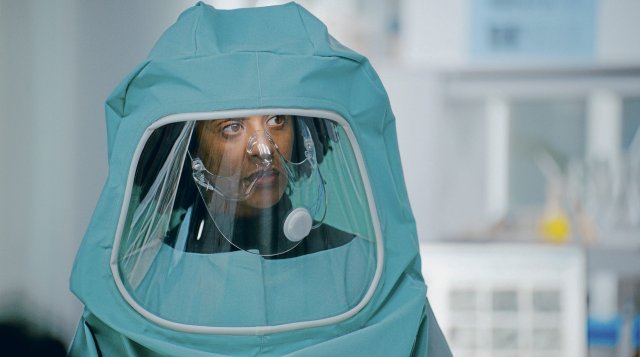Since Corona at the latest it has been clear: This is no longer science fiction.
Photo: ARD Degeto/Maipo
Self-sufficiency is anything but a core virtue of autocratic systems. The Greek translation, however, has fascinated many people ever since free trade and a market economy connected the world: self-sufficiency. Economic independence, so the prevailing hope, will not only keep imported goods and services on the national doorstep, but also intruders, crises, “foreign stuff.” Even lovely Norway is closing down with this argument. Already today, hardly any refugees are allowed into the country. Complete in 2037.
Climate change is raging, the world order is shaking, chaos and ruin everywhere. The populist Our Way party had long since decided to turn their liberal country into a fortress. And so in the ARD series “The Fortress” it builds a border wall that is insurmountable even for neighboring Swedes if they beg for asylum en masse in front of it.
Sounds surreal? It’s actually hard to believe, but by no means illusory. At least as Linn-Jeanethe Kyed and John Kåre Råke imagined it. Fattened for decades by fossil fuels such as oil and gas, the supposed model state may have significantly heated up the earth; Now its petro-crowns finance a dense network of greenhouses and aquacultures that, at least in the food sector, make imports unnecessary. As long as everything works.
During the election campaign, of all times, a salmon die-off threatens the main source of protein and thus the agreement of the authoritarian democracy under Prime Minister Heyerdahl (Tobias Santelmann): security of supply against police state methods. While the government blames introduced bacteria, scientist Esther Winter (Selome Emnetu) suspects a homemade problem and, as the saying goes, stings a wasp’s nest.
The pathogen doesn’t just seem to spread to people; its existence could also have something to do with experiments by a large state-owned company and thus endanger Heyerdahl’s re-election. A danger that his mastermind Ingvild Kamfjord (Rebecca Nystabakk) and her assistant Ariel Movinkel (Eili Harboe) tackle with the arsenal of commercial autocracies: Instead of the message, the messengers are fought and substitutes are sought, found and stigmatized.
Here too, as so often: refugees. For example, in the form of the (British!) migrant worker Charlie (Russell Tovey), who works hard to earn a Norwegian passport as a harvest worker, while his wife Uma (Nina Yndis) tries to get to the promised land illegally. For five hours, the directing duo Cecilie Mosli and Mikkel Brænne Sandemose outline the slow withering away of a democracy on the thorny road to dictatorship, without constantly hitting the radical drumbeat.
The paranoid surveillance state sometimes defends itself with brutal severity against internal and external opponents, but constantly tries to give the appearance of eco-social liberality for the benefit of the locals. When a border officer in the reception center declares his country to be the best in the world because it has rules, but adds cuttingly, “If you break these rules, then you have to leave our country,” that sounds more martial than any paramilitary police operation.
As visually powerful and plausible as the picturesque land of the fjords is being turned into a fortress, it is a bit surprising that Norway’s wall not only keeps the miseries of once-flourishing civil societies such as Great Britain from the barbed wire, but also climate change. In any case, the weather is more likely to be clear to cloudy than hot and stormy. Self-sufficiency does not mean not having German cars or Chinese smartphones. And European tugboats have even more empathy for their passengers than comfort on board completely seaworthy ships, which is just as bizarre as the misogynistic synchronization of self-confident women according to the childish pattern.
But beyond that, the depiction of the isolation processes is unfortunately conceivable and, in its mixture of the German island dictatorship dystopia “Helgoland 513” with elements from “The Last of Us”, is still always captivating despite a few too many thriller elements. “We should have built a wall around the North Sea,” says Esther’s neighbor as her hometown of Bergen faces a complete lockdown. “Then we wouldn’t have been infected.” This is how populist-driven discourses in illiberal democracies work, and this is also how “The Fortress” works.
In short: a flick, cliched and a bit too sunny, but shockingly plausible.
“The Fortress”, 7 times 45 minutes, complete in the ARD media library
Become a member of the nd.Genossenschaft!

Since January 1, 2022, the »nd« will be published as an independent left-wing newspaper owned by the staff and readers. Be there and support media diversity and visible left-wing positions as a cooperative member. Fill out the membership form now.
More information on www.dasnd.de/genossenschaft
judi bola judi bola online sbobet link sbobet
